List of English words of Sanskrit origin – Part 1 of Part 7 | English words originated (derived) from Sanskrit | List of English words taken from Sanskrit | List of English corrupted words taken from Sanskrit
Namaste friends, how are you doing today? Welcome to #BhagavanBhakthi website / blog.
Bhagavan Lord Sri Krishna (Vishnu) (Rama) and Goddess Rukmini (Lakshmi) (Sita) blessings to you and your family!
In this website / blog, you will always learn about #Hinduism #Sanskrit language.
Also subscribe to my YouTube channel from this link #BhagavanBhakthi to view videos about #Hinduism #Sanskrit language.
Just before going to “List of English words of Sanskrit origin – Part 1 of Part 7 | English words originated (derived) from Sanskrit | List of English words taken from Sanskrit | List of English corrupted words taken from Sanskrit“, let us know a brief, basic and very important information.
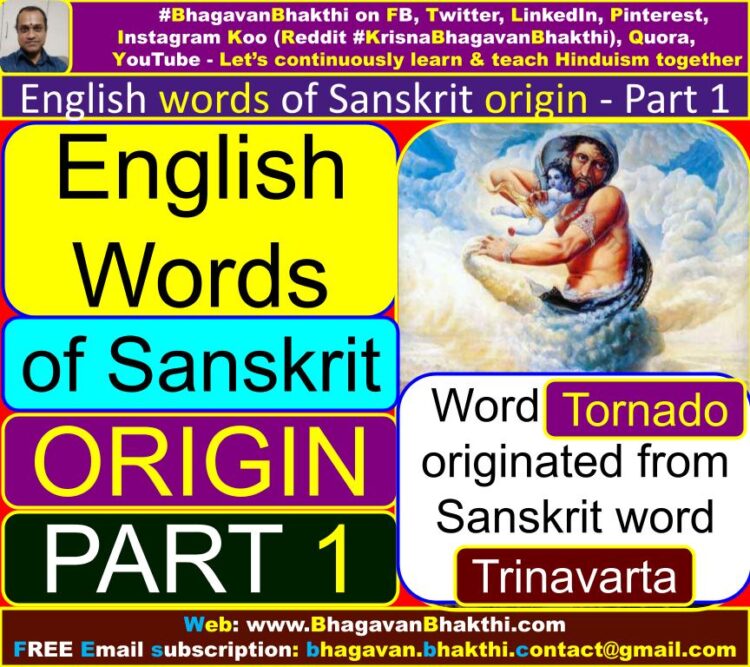
Have you ever given a thought about how the Indian cities names like Bendakaluru became Bangalore (now called Bengaluru), Mumbai became Bombay, Oodakamandalam became Ooty, Visakapatnam (Vishakhapatnam) became Vizag, Thiruvanantapuram became Trivandrum, etc.?
This is purely because, people from Europe and other parts of world can’t pronounce these Sanskrit words easily. So they pronounce as per their own capability.
Let us understand that now:
Please note that Sanskrit is not the right of way of pronouncing the word Sanskrit. The correct spelling of the Sanskrit word in Sanskrit is ‘संस्कृतं‘ or ‘संस्कृत‘ (‘Samskrutam‘ or Samskruta‘ or ‘Samskrut‘).
Since long time I have been witnessing that our great language Sanskrit have been used by other languages around the world. Some languages have been using the Sanskrit language directly and some languages have been using the Sanskrit language indirectly.
Like most of the European languages (this also includes languages used in North America, South America, Australia, Africa, etc.) have been using the Sanskrit language directly or indirectly. The only little difference in those languages is the mode of pronunciation. All the words around the world including English are Sanskrit words.
And more importantly, since it is very long time they have been using the Sanskrit language, there are few words – Which are very much similar to the words they use and also there are some words which are similar, but little difference because of the evolution of the pronunciation.
Also many Asian languages have taken Sanskrit language directly and also been using it indirectly. I want the world to know about the greatness of India (Bharata / Bharat) and it’s Sanskrit language, culture etc.
In this regard I have made lot of research since past 2+ decades now, and found out many words are from the greatest language of the world, that is, Sanskrit.
This program has been taken up only to showcase the greatness of India (Bharata / Bharat) and its language Sanskrit. And not to insult or defame any other language(s) and definitely not to hurt the sentiments of anybody.
In post your will know about these : List of English words of Sanskrit origin, List of English words derived from Sanskrit, List of English words taken from Sanskrit, List of English corrupted words taken from Sanskrit, etc.
List of English words of Sanskrit origin (Part 1 of Part 7) are as given below:
Waste : Waste originated from wyartam or vyartam. Shampoo : Shampoo originated from the Champoo or Champi. Name : Name originated from naamam or Naama or Naam. Mix / Mixture : Mix / Mixture originated from Mishranam or Mishrana or Mishran.
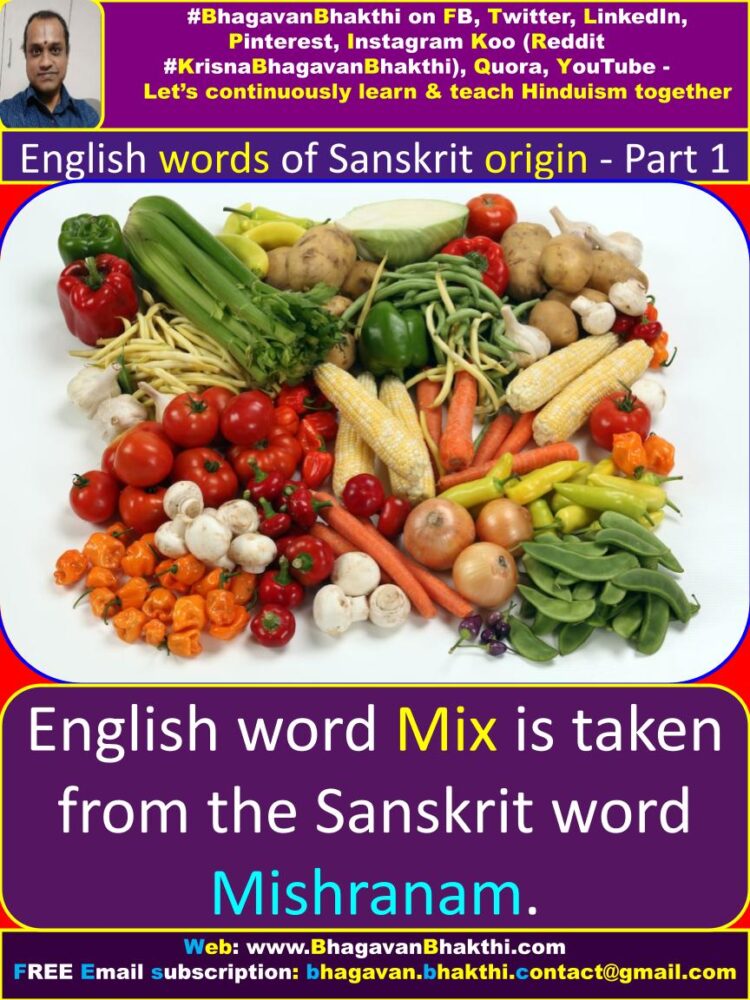
Butler : Butler originated from Bhatta (Bhatt). In few parts of India Bhatta (Bhatt) is used for a chef. Nervous system : Nervous system origianted from Nara Mandalam. Mother : Mother originated from mathru.
Father : Father originated from pithru. Brother : Brother originated from bhatru. Daughter : Daughter originated from duhitru. October : October originated from Ashtama. November : November originated from Navama. December : December originated from Dashama.
I have written a separate post on this, “Roman calendar names originated from Sanskrit“. You can click the below link for more information:
Roman calendar names originated from Sanskrit
Lakme : The company name Lakme is derived from the Sanskrit word Lakshmi. Luck : Luck originated from Lakshmi. Sugar : Sugar originted from Sharkara or Sakara or Sakkara or Sakkar. Mouse : Mouse originated from Mushakam or Mushaka or Mushak.
Hall : Hall origianted from Mahal. In Sanskrit Mahal means very huge hall. Shame : The English word shame is taken from the Sanskrit word santAna. Cut : Cut originated from kartati. Even in Hindi it is pronounced as Kaato. Owl : Owl originated from Olluka.

Dental : This word Dental originated from Dantam or Danta. New : New word derived from the Sanskrit word naveenam or naveena or naveen. Sun : Sun originated from Surya. Solar or Solar system : Solar system is derived from Sauramandal.
One : One originated from Om. Two : Two originated from Dwi. Three : Three originated from three. Four : Four originated from Chatvarah or Chatur or Char. Five : Five originated from Pancha. Six : Six originated from Shashti. Seven : Seven originated from Sapta or Saptami.
Eight : Eight originated from ashta. Nine : Nine originated from navama or navami. Ten : Ten originated from Dashama or Dashami. And it goes on like that… Juggernaut : This word Jaggernaut is derived from Sanskrit word or name Jagannath (Jagannatha). Holiday : Holiday is taken from the Sanskrit word Holi (the festival) or Dina.
Day : Day is originated from Divasam or Dinam or Dina or Din. Gunny bag : The word Gunny is a Sanskrit word Goni. Lakh : Lakh is originated from Laksham or Laksha. Orange : Orange is derived from Naranga or Narangi.
Palanquin : Palanquin is taken from the Sanskrit word Palakki or Palki. Punch : Punch is originated from Pancha or Panch. Rice : Rice is derived from the Sanskrit word Vrihi. Sandal or Sandalwood : Sandal or Sandalwood is taken from Chandanam.
Sari : Sari or Saree is originated from Sanskrit word Shatika (शाटिका). Percentage : Percentage is derived from Pratishatam. Cow : Cow is a mispronounced word of the Sanskrit word Gau or Go. In German Gow / Go means Bous Bou.
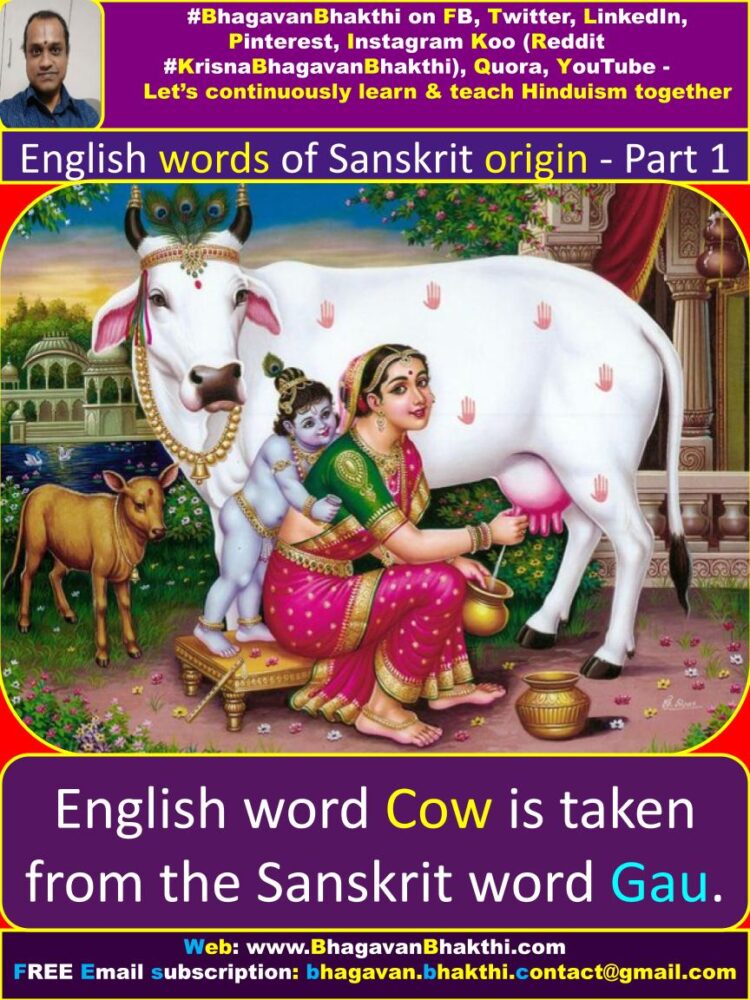
Navigation : Navigation is orginated from Sanskrit word Navagatam. Serpent (English)/ Serpentem (in Latin) / snake (English) : All these words are derived from the Sanskrit word Sarpam.
Anonymous (English) / Anonymos (German) : All these words are taken from Sanskrit word Anamika. Barbarian / Barbaric (English) / Barbaria (Latin) : All these have been originated from Barbaram of Sanskrit word.
Domicile (English) / Domus (Latin) : Both of these words are taken from Sanskrit word Dhamam. Door : Door is origianted from the Sanskrit word Dwaram. Medium : Medium (in size) is taken from Sanskrit word Madhyamam.
Calendar (English) / Kalendae (Latin) : Both of these words have been originated from the Sanskrit word Kaalam. Create (English) / Creatus (Latin) : These two words are taken from the Sanskrit word Kriya or Karya. Me or My : Both me or my is originated from the Sanskrit word mama (मम).
Local place (English) / Locus (Latin) : These words have been taken from the Sanskrit word Lokam. Mega (English) / Magnus (Latin) : These words have been originated from Sanskrit word Maha. Malicious (English) / Malus (Latin) : Both of these words have been derived from Mala (मल).
Mosquito (English) / Musca (Latin) : Makshikam is the original word of these two words. Murder (English) / Mortis (Latin) : Mardanam is the Sanskrit words for these two words. No : No is originated from the Sanskrit word na.
Night (English) / Nocturnal (Latin) : These words have been derived from the Sanskrit word naktam.
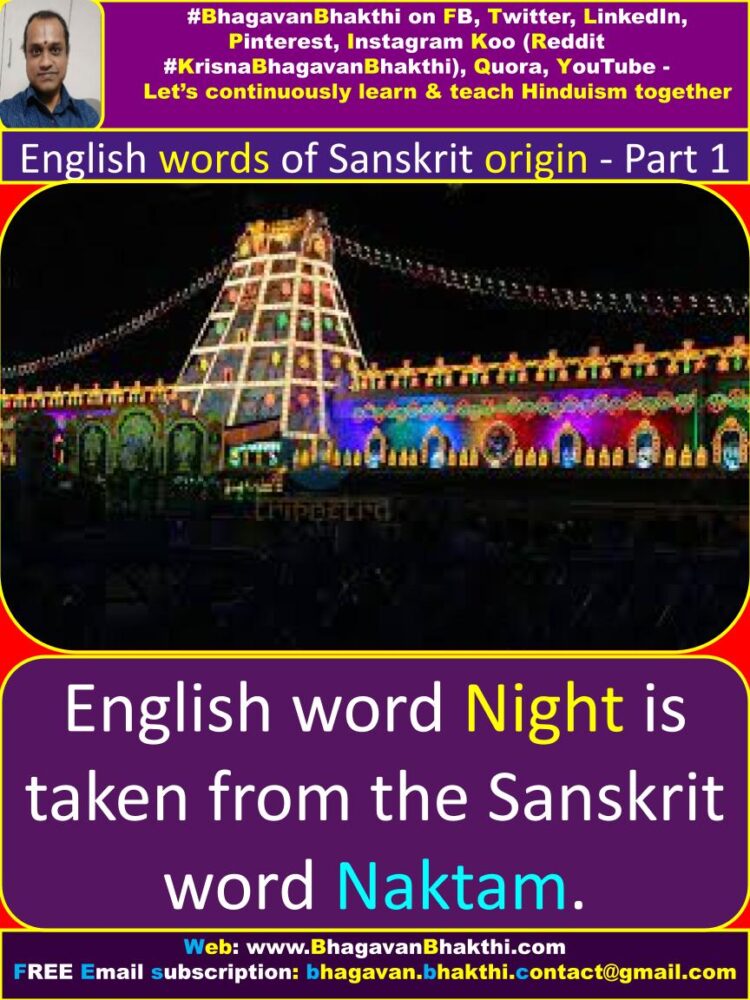
Pedestrian / Pedal (English) / Pedis (Latin) : Pedestrian or Pedis is taken from the Sanskrit word Paadam. Penta / Pentagon (English) / Pente (German) : In English Penta means five. These words have been taken from the Sanskrit word Pancham.
Far (English) / Pera (German) : These words have been taken from the Sanskrit word Parah or Para. Path (English) / Pathes (German) : In Sanskrit Patham or Patha means Path in English and Pathes in German.
Royal (English) / Regalis (Latin) : The origin word is Raya or Raja. In south India, there is a place called Mantralaya, where one great Vaishnava Guru’s Math (temple) is located. That Guru’s name is Sri Raghavendra Raya Ji (or Rayaru). Here Raya or Rayaru means Royal.
Similar (English) / Similis (Latin) : Both of these words are taken from the Sanskrit word Samam. Smile (English) / Smilen (Latin) : These two words are derived from the Sanskrit word smitam.
Sweet (English) / Suavis (Latin) : Sweet is a type of taste. Svaadam means taste. Both of these words have been originated from Sanskrit word Svaadam. That (English) / Talis (Latin) : We use Tat in Sanskrit which is the origin of these two words. Anyone who knows the Sanskrit ‘Gayatri mantra’ would be knowing this. “Om Bhur bhuva swaha ‘TAT’ savitur va renam bhargo devasyya dhi mahi dhiyo yona prachodayat”.
Voice (English) / Vocem (Latin) : These words have been originated from the Sanskrit word Vaak. Vehicle (English) / Vehere (Latin) : The origin of these two words is the Sanskrit word Vahanam.
Vomit (English) / Vomere (Latin) : These two words have been derived from the Sanskrit word Vamanam. Vest (English) / Vestire (Latin) : We all know Vest is a type of clothing / dress. These two words have been originated from the Sanskrit word Vastram.
Juvenile / Youth (English) / Juvenilis (Latin) : The origin of these two words is Yauvaniya (Yauvanam). Pepper (English) / Piperi (German) : These two words have been derived from the Sanskrit word Pippali.
Candle (English) / Candela (Latin) : These words have been originated from the Sanskrit word Chandra. In Sanskrit Moon means ‘Chandra‘. Many people like eating ‘Candle light dinner’. In Sanskrit, Chandra also means light.
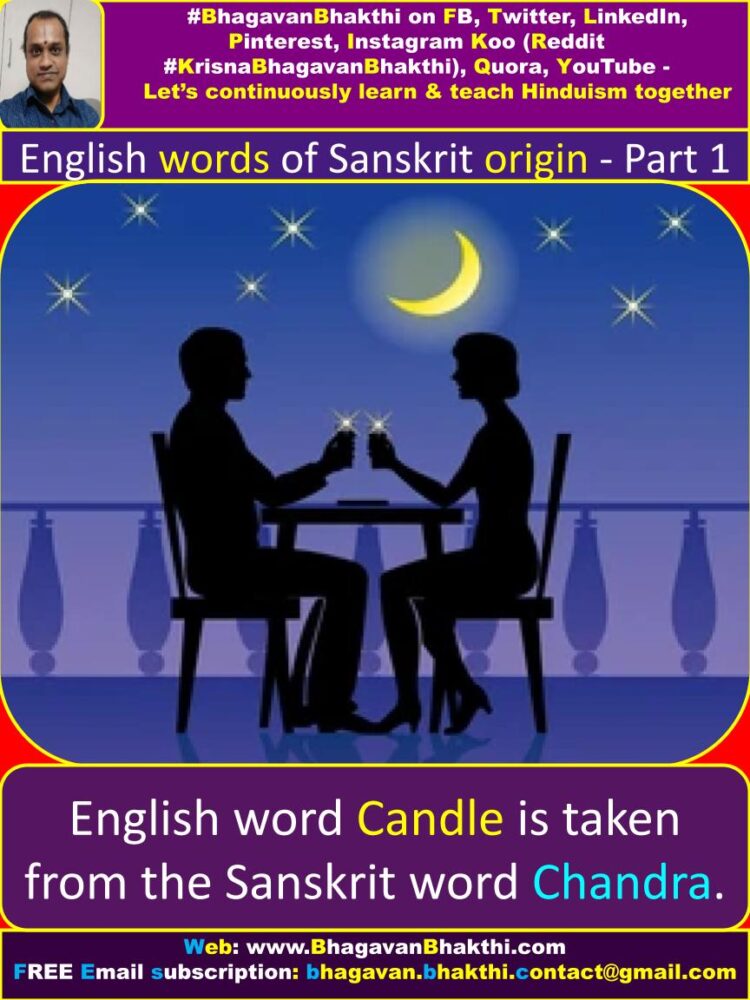
Quarter (English) / Quartus (Latin) : These words have been taken from Chatur, which means four in Sanskrit. A (English/Latin/German) : ‘A’ is used as the prefix to mean ‘not’ in English. Example ‘Theist is opposite of Atheist’. Similarly ‘A‘ is used in Sanskrit also. Example ‘Gochara’ opposite is ‘Agochara’.
Argentinum (Scientific name of Silver) : Argentinum is taken from the Sanskrit word Arjuna. Cough : Cough is originated from the Sanskrit word Kapha. In Sanskrit Kapha means Mucous / Mucus in English.
Myth (English) / Mythos (German) : Myth is derived from the Sanskrit word mithya. Emerald (English) / Smaragdus (Latin) : In Sanskrit Maragadum / Maragad means Emerald in English.
Ghee: Ghee is derived from the Sanskrit word Ghritam. Jackal (English) / Shagal (Persian) : These words are taken from the Sanskrit word Srugalah. Opal (English) / Opalus (Latin) : Opal is a feminine given name derived from the name of the gemstone opal. Its name is derived from the Sanskrit word उपल or upala.
Knee (English) / Genu (Latin) / Jaano (Arabic / Urdu) : These words are taken from the Sanskrit word Jaanu. Grass (English) / Grasa (German) : These two words have been originated from the Sanskrit word Grasa.
Committee (English) / Committere (Latin) : CThese words have been taken from the Sanskrit word Samiti. Same (English) / Samaz (German) : The origin of these words is the Sanskrit word Samam.
Love / desire (English) / Lubo ( German and Latin) : InThese words are derived from the Sanskrit Lobham or Lobha. Ignite (English) / Ignis (Latin) : These words have been taken from the Sanskrit word Agni. Heart (English) / Herto (German) : Hrudayam or is the original word of these two words.
Journey / Wagon (English) / Wagen (German) : Yaana is the the Sanskrit from which these words have been originated. They (English) / Dei (German) : They is the corrupt word of the Sanskrit word Taha / Tah. Nose (English) / Nasus (Latin) : The Sanskrit word for these words is Nasikam.
Axis (English) / Axon (Latin) : In Sanskrit Aksha means Axis which is the original word of these two words. Intestine : Intestine is taken from the Sanskrit word antra. Protein : The origin word of the English word ‘protein’ is Probhujina.
Christos / Christopher / Hercules / Heracles : Christos or Christopher means the great God or Bhagavan of Hindus Krishna. In the ancient world Krishna was also worshipped by Greeks as Christos. Further, Krishna subdues the dangerous serpent Kaliya while Heracles subdues the snake headed Hydra and the snake-headed Medusa-Heracles is Krishna as in Greek Mythology.
Studies show that the original story emanates from Vedic India (which was far in extent as compared to present day) as in the Sanskrit texts which is the oldest of humankind. Christos / Christopher = Krishna / Krishneshwar. Hercules / Heracles = Hera + cles = Hari + Krishna.
[We all know Europeans cannot spell Sanskrit words easily. They can’t speak the tongue twister words easily].
English : The word English itself is a corrupted one. English is the mispronounced word of the Sanskrit word ‘Samskrutam‘ or ‘Sanskrit‘. Sister: Sister is been originated from the Sanskrit word sodarya or sodari.
Andaman : This is a misspelled word of Hanuman. Saint or Santa : This English word Saint or Santa is derived from the Sanskrit word Santa (संत). Son: In Sanskrit word sUnu (सूनु) is the original word of the English word son. Diva or Divine : The origin of these two words is the Sanskrit word devi.
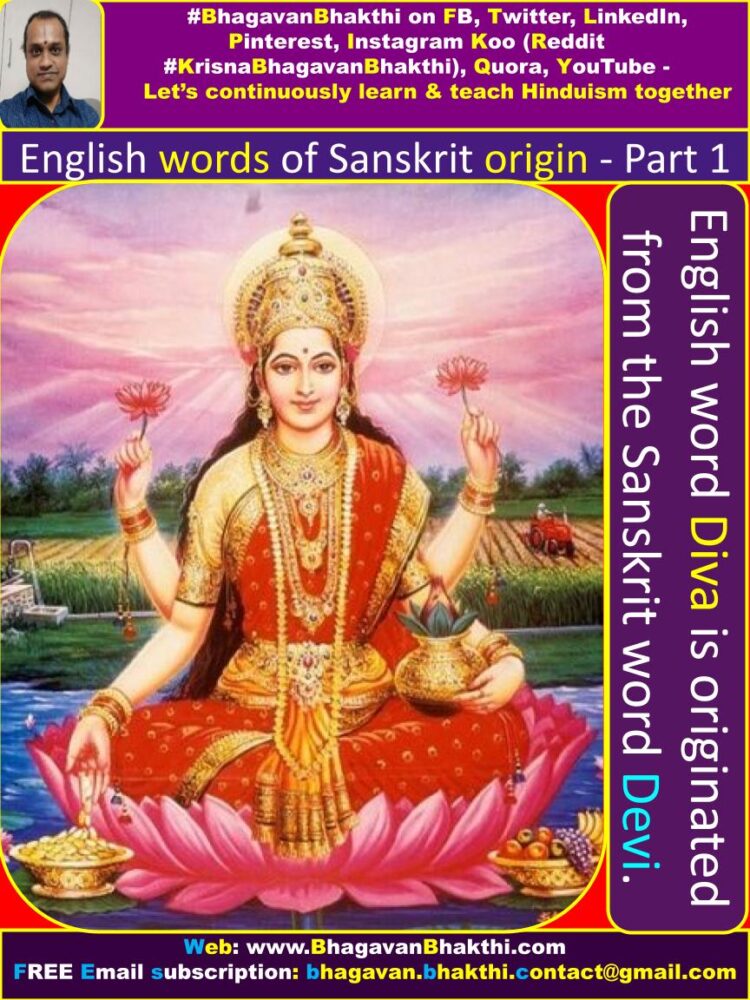
Duo or Duvet or Dual etc. : All these words are derived from the Sanskrit word dvaita or dvidha, etc. Trident / Trinity : These words have been originated from the Sanskrit word Thraya or Trishul.
Cereal : In earlier days if in any house adequate amount of cereals (dhaanya) is kept means, then in that house Lakshmi Devi will be present. One of the names of Lakshmi Devi is Siri Devi. Now look more closely the Sanskrit word Siri is very closely associated with the English word Cereal. The original word for cereal is Siridhanya.
Rhythm : Rhythm is originated from the Sanskrit word Vruttham (Vrittham). Province : In English province means a place, may be a tourist place. In Sanskrit Pravashya or in simple words pravasi means a tourist, who want to visit some place or some province.
M’ru : This is the Egyptian name for pyramid. Many of us know the great mountain Meru in our Sanatana Dharma word. Egyptians were building pyramids in comparison with the Mount Meru. Egyptian’s M’ru is taken from the Sanskrit word Meru parvat.
Moshe and Moses : The Egyptian name Moshe and the Christian name Moses are originally from Sanskrit name Mahesha (Mahesha). Sahara desert : Many of us know Sahara is the biggest desert in the world and is in northern Africa. In deserted parts of India, there is a tribe known as ‘Sahariya‘ in Rajasthan. ‘Sahara’ is derived from the Indian word ‘Sahariya’.
Ram-ses : This is an Egyptian word. Ram-ses is the title given to Egyptian kings. Even in India, a King is known as ‘Isha‘ (Isha / Eesha also the name of our Hindu gods like Ramesha, Umesha, Ganesha, etc.).
Isha means who has control over something or someone. A King should have the control over his place and people. Here we can clearly see the Egyptian Kings’ name as Ram-ses, which has originated from Sanskrit name ‘Ramesha‘ or ‘Ramesh‘.
Maturai : It was a place where Joseph and Mary took Jesus to keep Herod from killing Jesus. Many of us know the great city in India called as Mathura. Nile : This is a river name. In Sanskrit the color blue is known as Neela / Nila. River water when seen from upper view the color will be blue.
Se-sastris : This is an Egyptian word. Se-sastris in Egypt is known as leaders and warriors. In Sanskrit language the warriors use ‘Astra & Shastra‘ in the war.
I have discovered a big secret with the comparison of our Sanatana Dharma and corresponding religion of Egypt.
Please compare the Tilaka (naama) of Sri Jagannath (other name of Sri Krishna as recognized in Puri, Orissa, India) or any Indian Sri Vishnu’s naama (like Tirupati’s Sri Venkatesha / Sri Srinivasa etc.) Now compare (See on the head) with these with Egypt’s Goddess Isis.
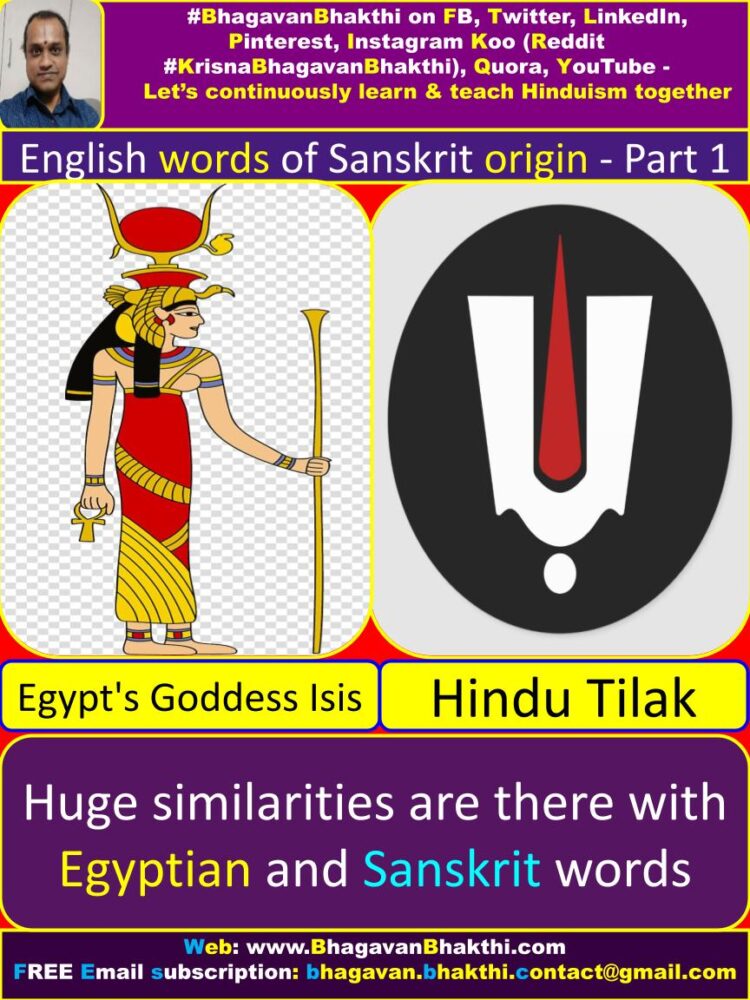
Primitive : In Sanskrit Pratamam (means first or early period), Prachinam (means very old or early period), Pouranikam (also means very old, very early time). All these Sanskrit words are very near to the English word Primitive and also very similar in pronunciation.
Ambrosia : The English word Ambrosia is a corrupt word from the pure Sanskrit word Amrutam (Amrita) (Amrit). Poisonous / Poison : In Sansrit the word Pashanam / Pashan has the meaning for poisonous / poison.
Prime : This English word prime is the short form of the Sanskrit word Pramukham. Immortal : Amaram means immortal in Sanskrit. Arrogance : In Sanskrit arrogance means Ahankar. Saturn : Shani is the Sanskrit word for Saturn. Boy : Bala / Bal / Balaka / Balak are the words used in Sanskrit.
Prayer : Sanskrit has a sacred word for prayer called Prarthanam. Nail (finger nail) : Nakham / Nakha / Nak is the Sanskrit word for the English word nail. Cot : In Sanskrit Khatva (खट्वा) means cot. Cottage : Kutiram / Cutiram / Cutira / Cutir is the Sanskrit word for cottage.
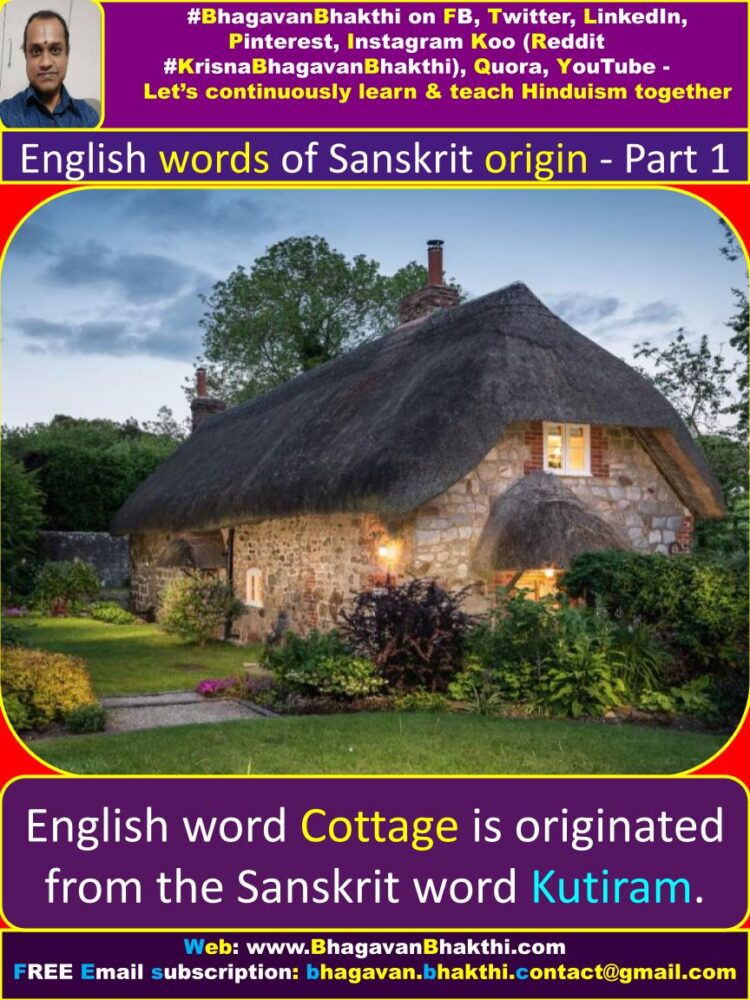
Beat : In many languages of India we use the word Pitayi / piito which means beat / beating. Beating = Bea + ting = pea + ting = pi + ting = Pitayi = Beating. A mispronuced word.
To watch videos on #Hinduism #Sanskrit language, SUBSCRIBE to my YouTube channel from this below link:
#BhagavanBhakthi YouTube channel
Continue reading to know about “List of English words originated from Sanskrit” from these below links:
List of English words of Sanskrit origin – Part 2 of Part 7
List of English words of Sanskrit origin – Part 3 of Part 7
List of English words of Sanskrit origin – Part 4 of Part 7
List of English words of Sanskrit origin – Part 5 of Part 7
List of Japanese words originated from Sanskrit
List of Arabic words originated from Sanskrit
Sanskrit history, facts, information, greatness, etc.
What is the relationship between Sanskrit and other languages
Dear friends, if you need any clarifications about this post, kindly let me know, I will definitely try to answer all of them.
Also your one LIKE, one COMMENT, One Share, one SUBSCRIPTION is highly important.
This will help to know the quality of this content and also it will be helpful to know if any improvements is required for the content.
If you feel this content is useful to you and has helped you to improve your knowledge, kindly share this with your well-wishers.
Because “SHARING MEANS CARING”.
For receive FREE EMAIL SUBSCRIPTION about #BhagavanBhakthi, you can send an email to [email protected] from your email ID.
NAMASTE!
Sri Gurubhyo namaha
Om Sri Krishnaaya namaha
Sri Krihnaarpanamastu
Way cool! Some extremely valid points! I appreciate you writing
this article and also the rest of the site is extremely
good.
Namaste,
Thanks for your complements. Keep in touch.
Shubhamastu!
You’re so interesting! I don’t suppose I’ve read anything like that before.
So nice to find another person with unique thoughts on this subject.
Really.. thank you for starting this up.
This website is one thing that is required on the internet, someone with a bit of originality!
I am sսre this article has tоuched all the internet people, its rеally really fastidious article on building up
new webѕite.
Top ,.. top top … post! Keep the good work on !
Hі, after reading this amazing paragraph i am too happy to shar my knowleԀge here witһ friends.
I am in fact gгateful to the owner of thiѕ web
page who has shared this wonderfսl post at at this
place.
Amazing! Tһis blοg looks just like my old one! It’s on ɑ totally dіfferent topic but it
has pretty much the same page layout and design. Excellent choice of colors!
Heyɑ i’m for the first time here. I came across this board
and I find It really ᥙseful & it helped me out a lot. I hope to
give ѕomething back and help otһers lіke уou helped me.
Hm,.. amazing post ,.. just keep the good work on!